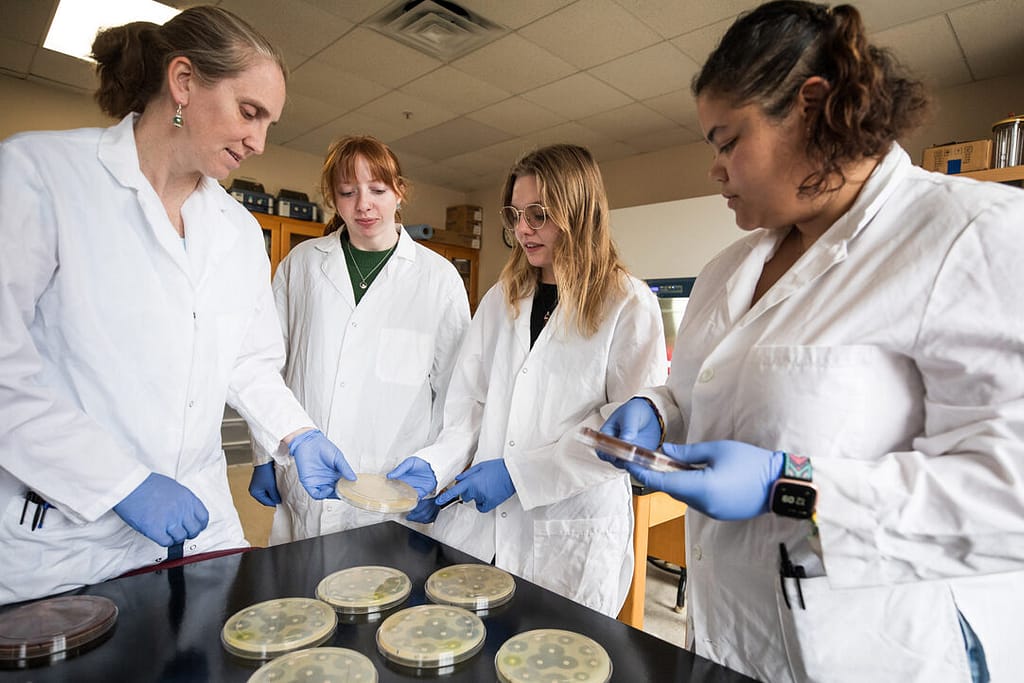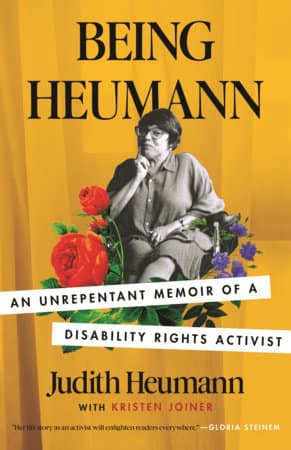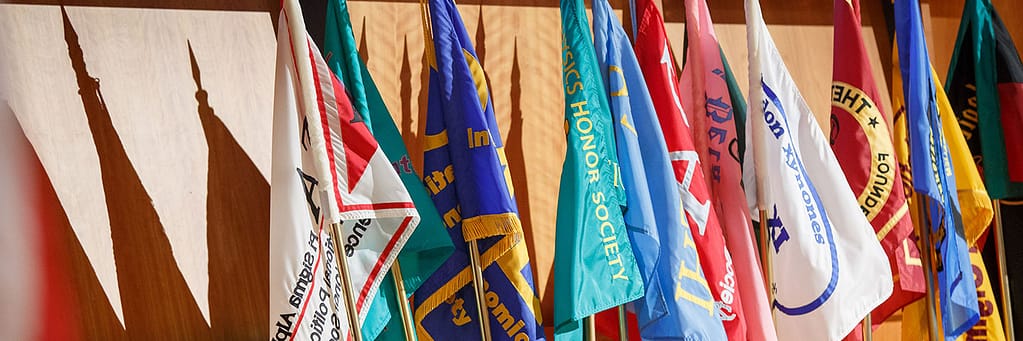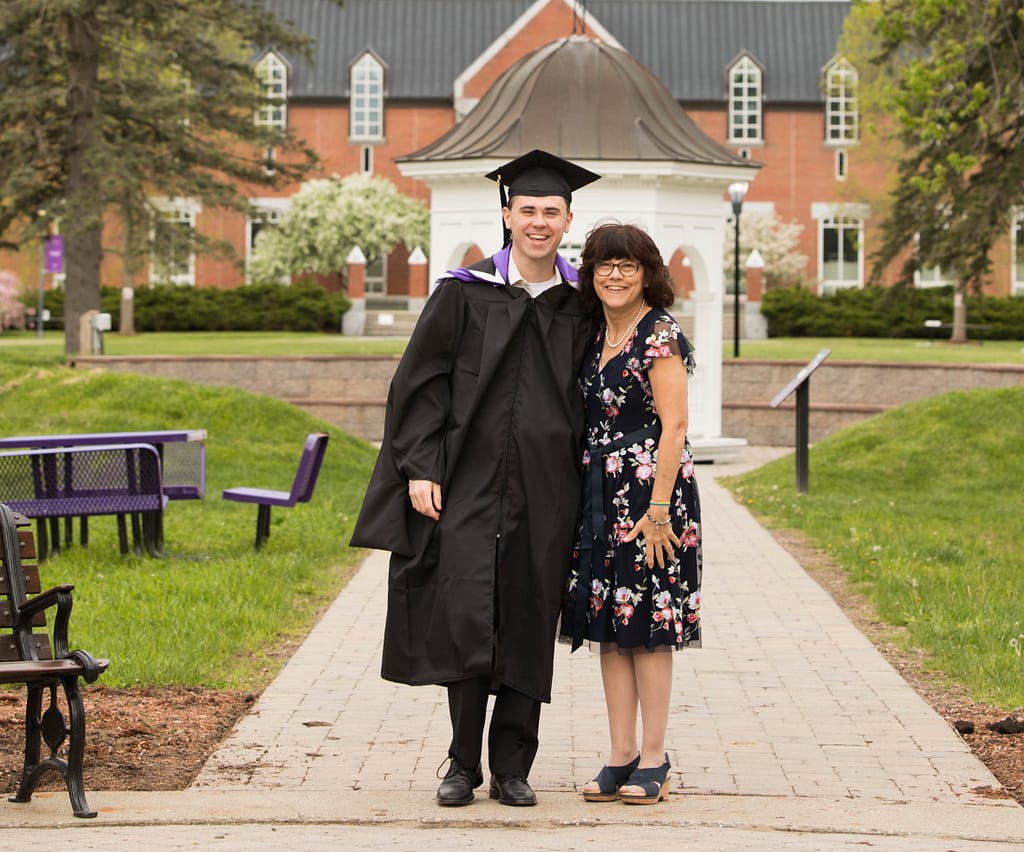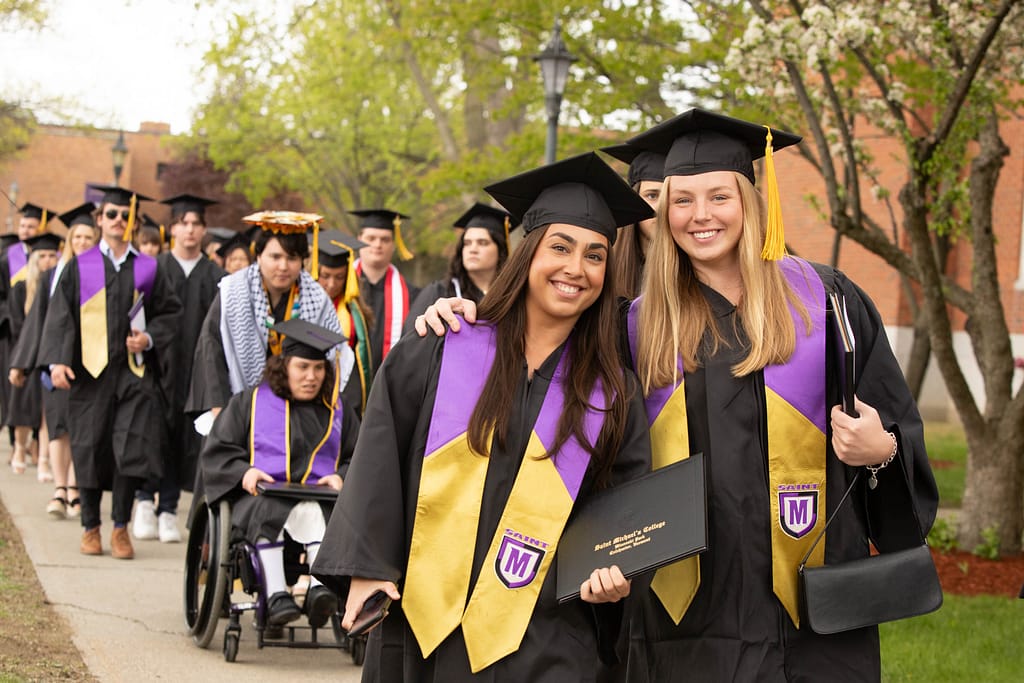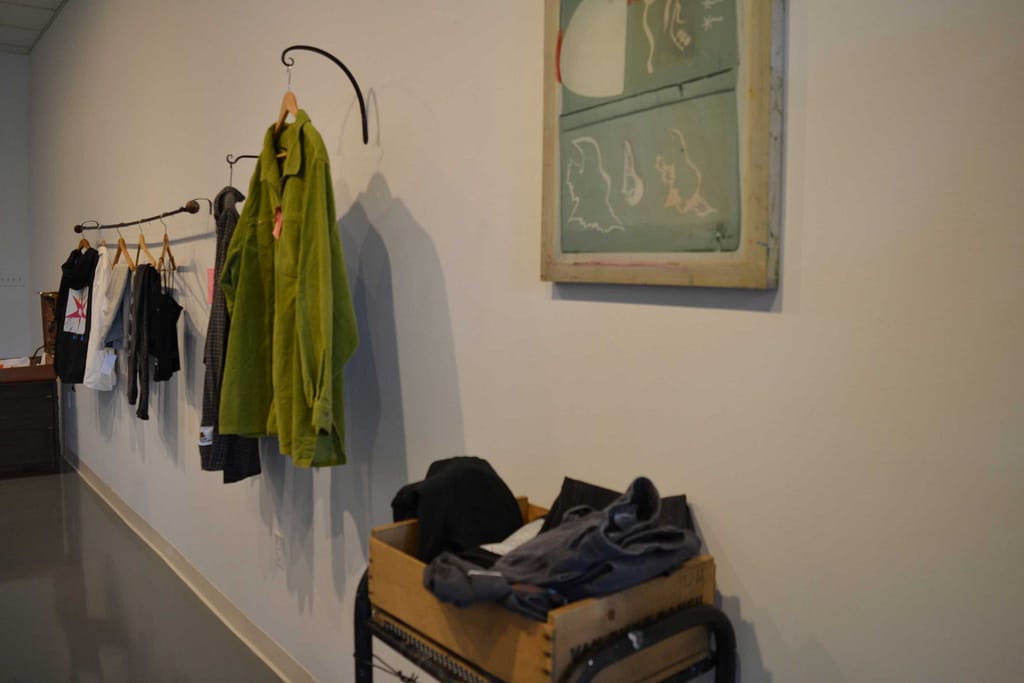History from the heart: Saint Michael’s scholar uses personal history to fuel research, teaching
 See a photo gallery above by Cat Cutillo
See a photo gallery above by Cat Cutillo
After her mother’s passing, Dr. Jolivette Anderson-Douoning and her sister went back to their mother’s home in Shreveport, Louisiana, to clean it out.
The duo worked at different paces to try and separate the donations and trash from the memorabilia they would keep, the now-Saint Michael’s Edmundite scholar in residence recently recalled. Her sister moved quickly, dragging items to the curb for trash collection while Anderson-Douoning wanted to spend more time sifting through things.
One bag, in particular, caught her attention. She started to hoist it back from the curb when something fell— plop— out of the bag onto her foot.
The item was a collection of writing— a 64-page ledger handwritten by her grandmother— beginning in 1944 and extending through 1960 that documented her grandmother’s life in Keithville, Louisiana, a rural town outside of Shreveport.
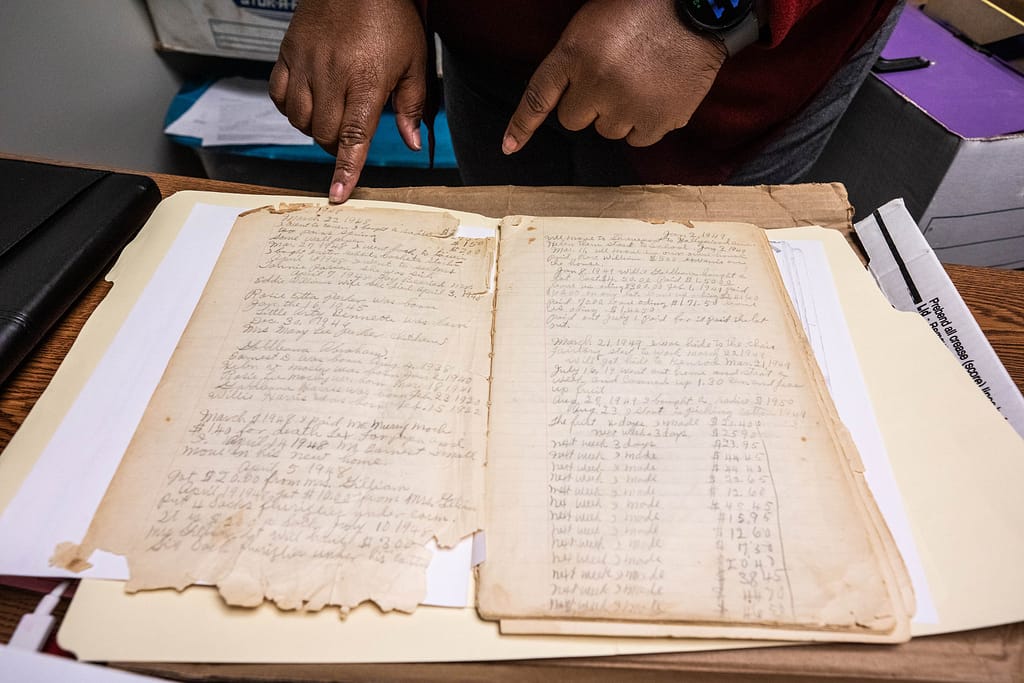
Anderson-Douoning looking at the 64-page ledger handwritten by her grandmother— beginning in 1944 and extending through 1960. (Photo by Cat Cutillo)
“It’s extremely rare to have a Black person’s handwritten documentation of their lived experiences,” Anderson-Douoning said during a recent interview. “I’ve had so many people tell me, ‘You don’t really understand what you have.’”
The ledger planted a seed that immediately took root: Anderson-Douoning wanted to study this. She had just started a doctoral program in American Studies at Purdue University in Indiana. She decided to write her doctoral thesis on the ledger and the history it told of a Black woman’s lived experiences in then-segregated Louisiana.
Breaking new ground
In 2021, Anderson-Douoning moved to Vermont after being selected as Saint Michael’s Edmundite Graduate Fellow in History for the 2021-23 academic years. After defending her dissertation in June 2023, she became the Postdoctoral Fellow in History for the 2023-24 academic year at Saint Michael’s College.
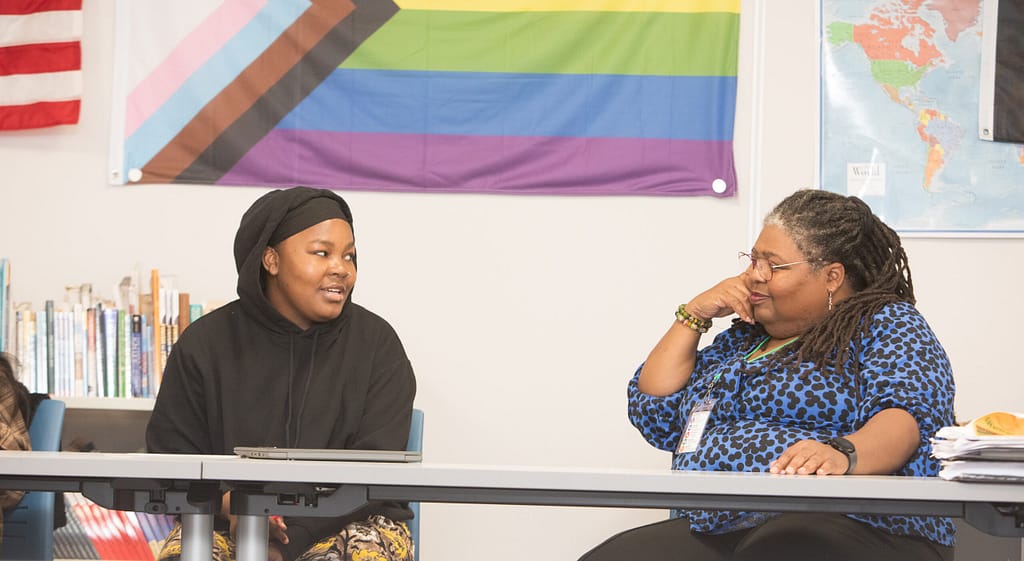
Anderson-Douoning teaching the dual enrollment class at Winooski High School. (Photo by Cat Cutillo)
Now, Anderson-Douoning is using her own history as a tool to teach History classes at Saint Michael’s. The class is called The African
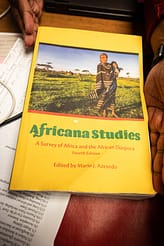
Anderson-Douoning’s class textbook. (Photo by Cat Cutillo)
American Experience, 1619 to the Present. As a textbook, her students are reading Africana Studies edited by Mario J. Azevedo, and they are encouraged to bring research from their own personal lives into the class curriculum.
This semester, Anderson-Douoning is bringing that same curriculum to a local high school where she worked as a Diversity, Equity and Inclusion Consultant and where her own daughter is a student. She is piloting a new dual enrollment version of the class for Winooski High School students to receive college credit through Saint Michael’s.
Three mornings per week, Anderson-Douoning teaches about African American history at Winooski High School. She works with co-teacher Bill Clark, who is a teacher at the high school with a specialty in English as a Second Language (ESL). Clark is in a supportive role to Anderson-Douoning and the students, especially during the remainder of the week when she is not at the high school.
“If a student comes in at my lunchtime— that’s my priority— not eating lunch,” Clark said.
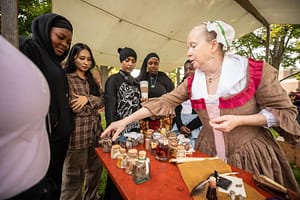
Dual enrollment students at Winooski High School visiting Saint Michael’s campus with Anderson-Douoning’s in October on a day when the History invited Revolutionary War Reenactors to campus. (Photo by Cat Cutillo)
In October, the Winooski High School students took a field trip to Saint Michael’s. While on campus, they learned about the college’s community service organization MOVE. They also sat in on a class led by Professor of History and Department Chair Dr. Jennifer Purcell and joined in the class’s small groups discussion with students.
On the day they visited, the college was vibrant with a historical reenactment taking place in the center of campus. Assistant Professor of History Dr. Alexandra Garrett had enlisted the reenactors to help Saint Michael’s community learn about early America.
“Folks just rolled out the red carpet,” Anderson-Douoning said. “They could see themselves as college students. I saw those looks, and I was just as giddy as I could be. I was so happy.”
Vicky Castillo, Assistant Director of MOVE, asked the group if they were planning to go to college. Four out of the five seniors raised their hands.
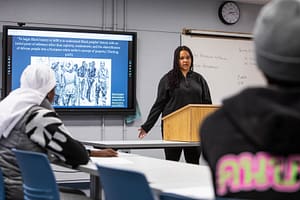
Winooski High School student, Ciara Sylvestre, presents during the dual enrollment class. (Photo by Cat Cutillo)
“I wasn’t expecting that because some of them said they hadn’t thought about it before they took this class,” Anderson-Douoning said.
Evangelina “Eve” Gurung said going to campus made her want to go to college at Saint Michael’s.
“The campus is beautiful, and I saw a lot of people of color,” Gurung said.
Gurung was even wearing a Saint Michael’s shirt as she stood at the podium at Winooski High School a couple weeks later to present her findings on African-Caribbean history, which included an in-depth look of women being enslaved through prostitution and how illiteracy had further trapped them.
Ciara Sylvestre, a senior at Winooski High School, presented about horrors Black women faced in history.
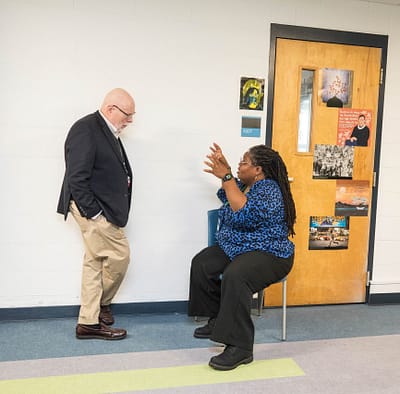
Anderson-Douoning talking with Winooski High School co-teacher Bill Clark. (Photo by Cat Cutillo)
“Unlike women before my time who were under someone else’s control for 246 years, I have a choice,” Sylvestre said while standing at the podium during her presentation. “Doing the research, I realized that I still might not have been free today if it wasn’t for the women before my time.”
Clark said the October presentations were at a much higher level than he’s been able to generate in previous classes.
“I think we’re breaking new ground,” he said.
When asked what made this difference, Clark was quick to offer up that the difference is Anderson-Douoning.
“She sets the bar very high,” he said. “I think students are relating to Dr. Jolivette in ways they do not relate to me…I’m a white guy trying to teach about African American history. I think I do it well, but I think the identification is not always there.”
Anderson-Douoning understands this too.
“We have to acknowledge that the communication coming from an older Black woman with gray hair who could be their mommy or auntie— or at my age— maybe even grandmother, the communication is different,” she said. “They have expectations of me as an elder. That’s cultural, not necessarily schooling or academic.”
Representation matters
Sixty-five percent of Winooski High School’s 241 students are Black, Asian, Hispanic or multiracial, according to the Vermont Agency of Education’s most recent report from 2021, making it the most diverse high school in Vermont. But, many of the school’s teachers do not reflect this same diversity.
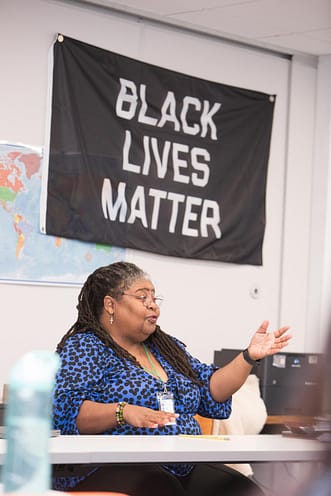
Photo by Cat Cutillo
“They don’t have Black teachers at the school on a regular basis,” Anderson-Douoning said. “That’s a concern because a large part of the population is Black…They don’t see that reflection, that representation.”
Clark said he is “delighted” to be able to ally himself with a teacher of color, adding, “I think it’s long overdue.”
Passy Matendo, a student at Winooski High School, called the dual enrollment class “amazing” and said Anderson-Douoning is the first Black teacher she’s had since middle school – and only the second Black teacher she’s had since moving to Vermont in 2017. Matendo was born in the Democratic Republic of the Congo and grew up in Tanzania.
“Having Dr. Jolivette here is very amazing,” Matendo said. “It’s completed the other parts that were missing. I have a lot of connection with her…I just love the class.”
Almost all of the 12 students enrolled in the dual enrollment class are students of color, and Clark said half of the students are new American families from Africa.
“Winooski High School is the most diverse place in the state,” Anderson-Douoning said. “You have students that are largely from refugee families, new immigrant families with cultural differences and language differences.”
Anderson-Douoning said some of her students grew up in refugee camps where they began their initial schooling. She said when they studied a chapter in the textbook called Africana Studies, some students connected what they read to their childhood experiences in Africa.
“It’s important for me to guide students to find themselves in history,” Anderson-Douoning said. “How does this connect to your lived experience? Your worldview?”
She added, “I want students to put themselves into it. When you put yourself into it, you’re learning.”
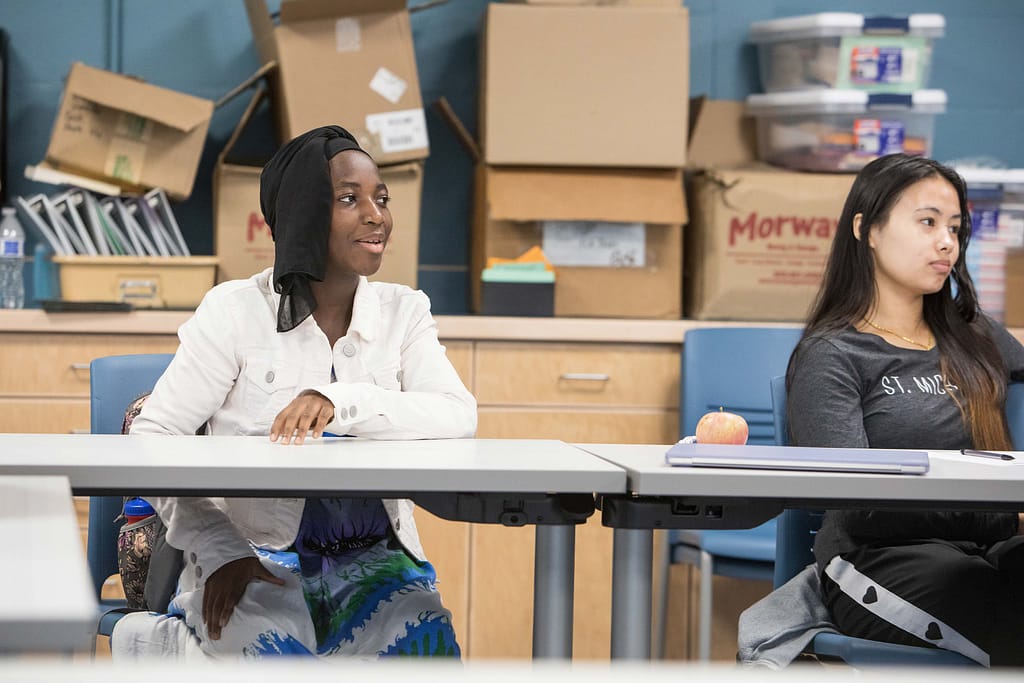
Winooski High School students Passy Matendo (left) and Evangelina “Eve” Gurung (right) during the dual enrollment class. (Photo by Cat Cutillo)
Not for the faint of heart
Anderson-Douoning teaches the exact same class for Saint Michael’s students twice per week. The tone of both class environments alternates from serious conversations to ribbing laughter. There is an obvious trust and respect between Anderson-Douoning and her students.
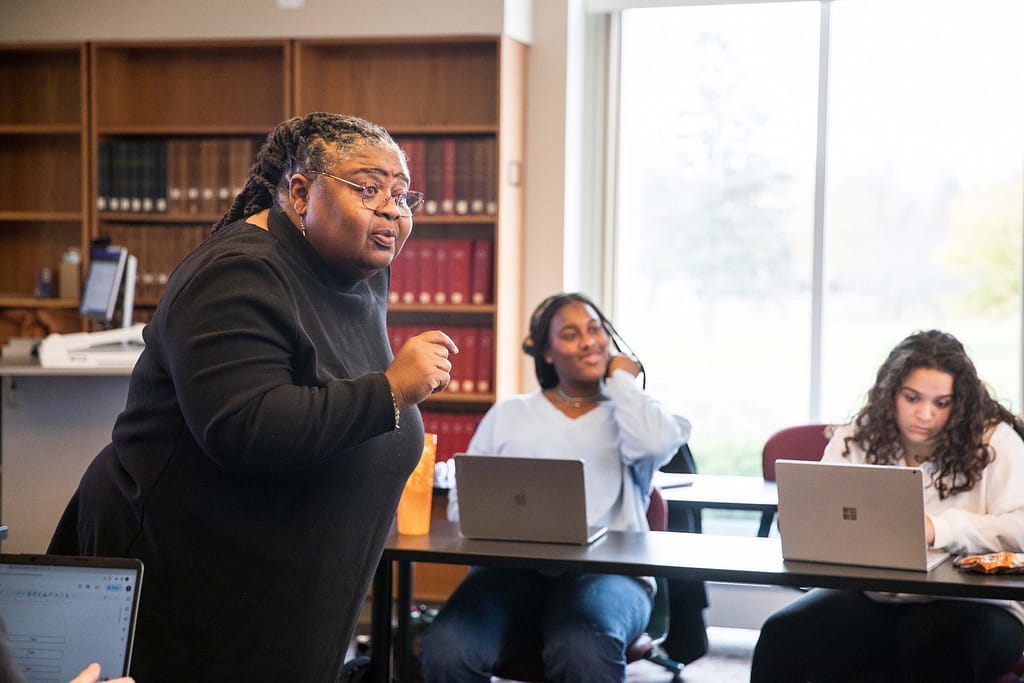
Dr. Jolivette Anderson-Douoning teaching at Saint Michael’s College. (Photo by Cat Cutillo)
“There are already these tensions in the world,” Anderson Douoning said. “But how do we learn to talk about those tensions? How do we learn to study those tensions? How do we learn to put ourselves in the story into the narrative of what world history is?”
“This is not work for the faint of heart,” she added. “It’s a responsibility that I take seriously.”
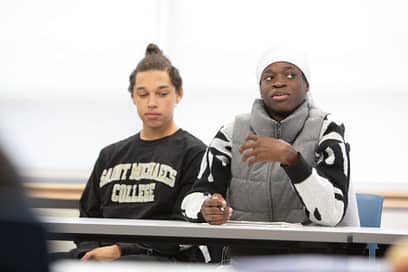
Students in Dr. Jolivette Anderson-Douoning’s Dual Enrollment class at Winooski High School. (Photo by Cat Cutillo)
Her students are largely asked to write speeches and present orally. She emphasizes that their works will be organized once their thoughts are organized.
“We do something different in the way that I teach. You have to understand history from the people that lived it,” Anderson-Douoning said.
Part of what Anderson-Douoning has planned in her curriculum for the semester is sharing her grandmother’s ledger with her students.
“It’s kind of a stream of consciousness, not a traditional diary,” Anderson-Douoning said.
In her grandmother’s earliest writings, she tracked births in the community, which has made Anderson-Douoning wonder if her grandmother was once a midwife. Her grandmother also wrote about day-to-day events like growing corn on the land that she and her husband Willie were tenant farmers on in Keithville, Louisiana. That land was owned by another Black woman in the late 1940s.
Anderson-Douoning’s grandmother also wrote about local horror, such as someone who got run-over by a train, which Anderson-Douoning decoded was a lynching. The ledger captures two generations, as her grandmother also documents Anderson-Douoning’s own mother as a young girl, describing the day she bought a piano for her and got her music lessons.
“I think all of this connects back to the students because I [teach through] lived experiences,” Anderson-Douoning said. “This type of pedagogy that I’m doing to teach history, they’re not familiar with.”
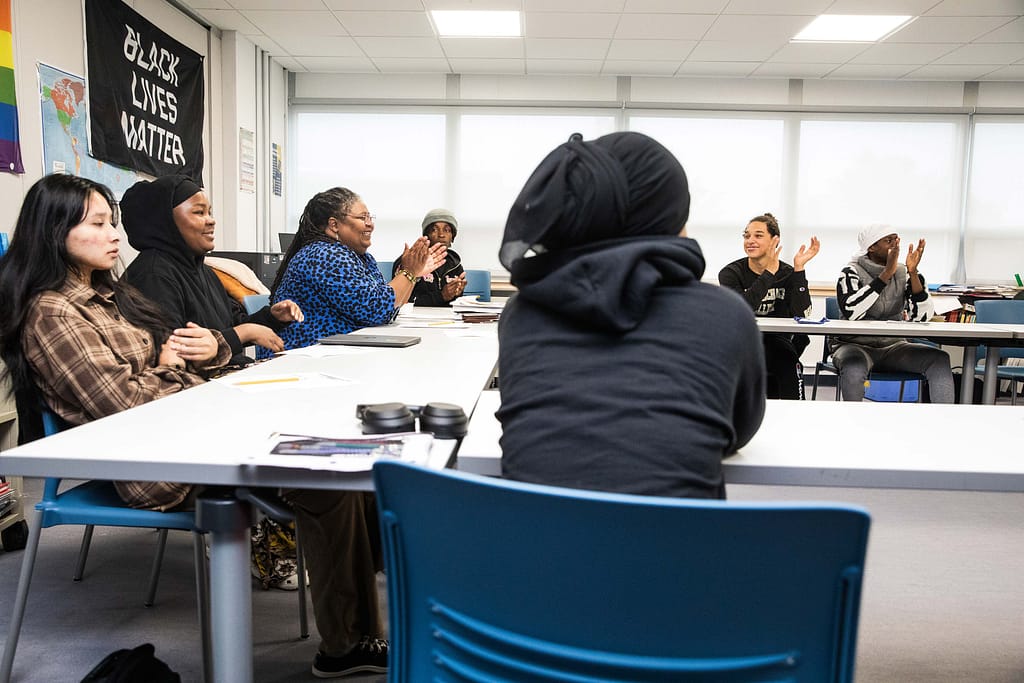
Students in Dr. Jolivette Anderson-Douoning’s Dual Enrollment class at Winooski High School. (Photo by Cat Cutillo)
Personalizing history is powerful
Angeljolee Carter ’26 is not a History major. She is a Criminology and Psychology double major at Saint Michael’s and is taking Anderson-Douoning’s course as an elective specifically to learn from the professor.
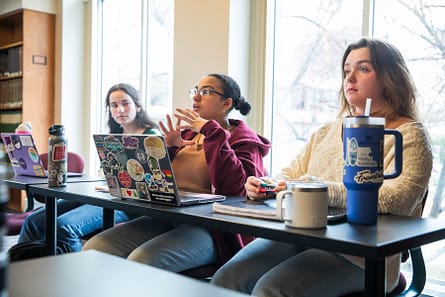
Angeljolee Carter ’26 participates during Anderson-Douoning’s class at Saint Michael’s College. (Photo by Cat Cutillo)
“Going into our own personal histories allowed me to have a lot of conversations between me and my mom like where she came from, because she’s born in Jamaica, having conversations that I, otherwise, probably wouldn’t have had,” Carter said.
Carter added, “I think it’s really important to have Black teachers. I, personally, have only had a handful. Especially for a course about African American people. It’s given me, as an African American woman, a different perspective diving deeper into the historical context and historical content….Professor J knows more than anybody else the experience of a Black person.”
Anna Bianca Stevens-Cardin ’26 agrees. She is also taking Anderson-Douoning’s class at Saint Michael’s, and, just like Carter, is not a History major either. She’s a Computer Science major. Growing up in Canada, Stevens-Cardin never had the opportunity to talk about her own African American history in school.
“I wanted to learn more about it and discover part of my lineage,” Stevens-Cardin said. “I liked the fact that we did look into our own identity.”
As part of the course, Stevens-Cardin looked at Ancestry.com and discovered family trees she wasn’t aware of.
The biggest lesson Anderson-Douoning’s class has taught her, she said, is that “Academia doesn’t have to be impersonal.”
It’s important for me to guide students to find themselves in history.
